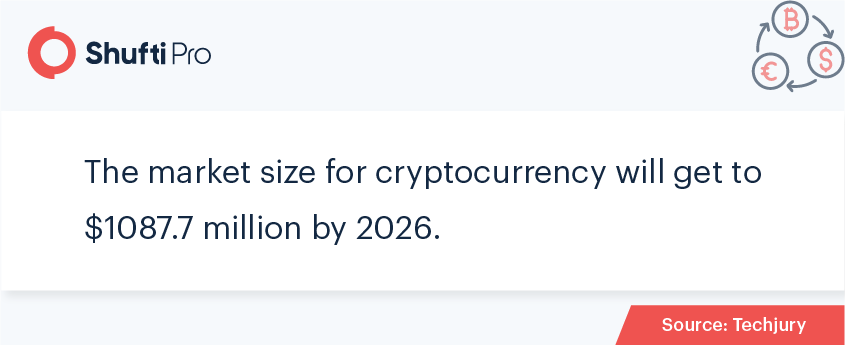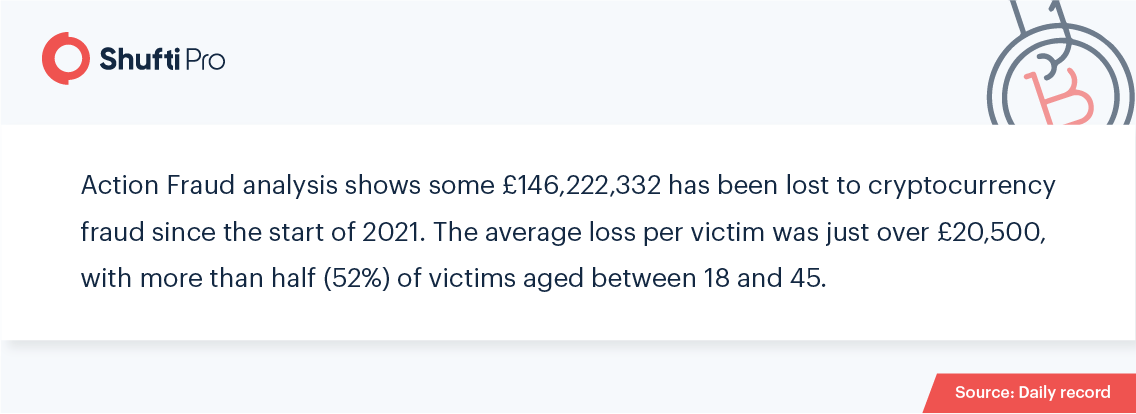Mounting Cases of Money Laundering through Digital Currencies in 2021

Even though cryptocurrencies like Bitcoin, Ethereum, and Dogecoin are increasing rapidly, yet the crypto industry is still evolving. As a result, regulatory authorities continue to monitor and scrutinize cryptocurrency activities to prevent money laundering and other criminal activities. According to Statista, the total bounty generated by bitcoin theft, including hacks and scams, was $513 million in 2020. According to experts, this figure is expected to increase by 74% by the end of 2021.
Unfortunately, as the value of several cryptocurrencies has risen dramatically in recent years, so has scammers’ interest. With consumer interest developing at a skyrocketing pace, large sums of money are being transported worldwide. Therefore, cryptocurrencies have become a near-ideal breeding environment for identity fraud and money laundering.

How does the UK regulate Cryptocurrency?
The Financial Conduct Authority (FCA) has enforced Customer Due Diligence (CDD) and Anti-Money Laundering (AML) regulations on cryptocurrency exchanges. As per these regulations, crypto platforms must verify the identity of customers during onboarding.
Money Laundering Through Cryptocurrency – A Global Issue in 2021
Cryptocurrencies are making it significantly easier for fraudsters to conceal the source of criminal activities and route the illicit capital across borders without being detected. As a result, financial crime, mainly money laundering using digital currency, is rapidly increasing globally. Let’s look at some of the money laundering cases reported recently.
The UK Makes Record-Setting Crypto Seizure in Money Laundering Investigation
UK regulatory authorities while investigating money laundering cases seized £114 million in cryptocurrencies on June 24, 2021. This case is supposed to be the record-breaking digital currency seizure in the country as well as one of the biggest in the world. These efforts demonstrated law enforcement’s commitment to preventing money laundering cases regardless of the type of assets involved, as well as regulators’ ability to track digital currency.
Chinese security officials arrested 11 suspects
Chinese law enforcement bodies have arrested 11 suspects in the first Central Bank Digital Currency (CBDC) money laundering case. Based on the Xinmi Police investigation, the government agencies alleged the suspects to laundered Yuan by routing the capital to a cross-border scammer group located in Cambodia. According to the law enforcement authorities, the fraudsters sought to manipulate the CBDC digital wallets to overcome the risk of getting caught.
Hong Kong Customs Arrested Criminal Group Involved in $1.2 billion Money Laundering Scheme
On July 15, Hong Kong Customs announced the arrest of four men in connection with a $1.2 billion money-laundering scheme employing the stable coin “Tether”. The men used a bitcoin exchange to make transactions and opened numerous local bank accounts. As a result, from February 2020 to May 2021, questionable funds were routed through bank remittances and virtual currency. Cryptocurrency transactions in roughly 40 e-wallets accounted for about $880 million of the entire amount.
Dutch Law Enforcement Body Seized €29 Million Worth of Cryptocurrencies
According to a release from the Public Prosecution Service, Dutch law enforcement seized €29 million in cryptocurrencies during the last several months due to different money laundering investigations. According to the inquiry, the arrested individuals include both Dutch natives and foreigners. Year after year, the euro value of confiscated crypto increases significantly. In 2020, the police seized €303 million, with cryptocurrency contributing barely $9.9 million of the total.

Digital Currencies – A Safe Haven for Money Launderers
The rise of blockchain technology has aided the proliferation of cryptocurrencies and other crypto assets. Cryptocurrencies, which are secured by cryptographic algorithms and circulated without a central bank, have adversely impacted established financial institutions and are frequently being traded over crypto platforms in jurisdictions around the world. However, the disruptive nature of cryptocurrencies has heightened the risk of criminals abusing technology to circumvent traditional anti-money laundering safeguards.
- Lack of compliance: Traditionally, financial assets are strictly regulated and legally protected across the world. Meanwhile, digital currencies are unregulated in various countries. However, the lack of universal laws and compliance makes cryptocurrencies attractive to fraudsters to launder money.
- Anonymity: Crypto transactions ensure anonymity; therefore, financial crime through this sector is on the rise. There are heaps of digital assets provided and e-wallets that render services with little or no AML/KYC compliance.
- Secure payment channels for frauds: Digital currencies and tokens have become a popular channel for carrying out transactions for criminal activities like illicit online gambling, ransomware attacks, terrorist group financing, and more.
FATF’s Revised Guidelines For Virtual Assets Service Providers
The Financial Action Task Force (FATF) has updated its guidance on the Risk-Based Approach (RBA) to virtual Assets (VA) and Virtual Assets Service Providers (VASPs). The Guidance was first published in June 2019 when FATF placed Anti-Money Laundering (AML) and Counter-terrorist financing (CTF) as obligatory for VAs and VASPs. In July 2020, the FATF updated this Guidance and made it public in a 12-month review report.
FATF has amended its 2020 guidance and the updated rules were published on October 28, 2021, which clearly states how the FATF guidance will be applied to VAs and VASPs.
The FATF virtual assets 2021 guidance clarifies the following aspects:
- VA’s travel rule
- Definition of Virtual Assets & VASPs
- The role of VASP supervisors
- VASPs licensing and registration guidelines
- Risks associated with peer-to-peer (P2P) transactions
- How countries must apply FATF standards to stable coins
- Tools to identify and combat the risks of P2P transactions
However, FATF asked private and public sector stakeholders regarding their thoughts on the amendment before finalizing the revisions to the Guidance. These amendments to the FATF’s pre-existing guidelines aim to keep a secure channel for the virtual asset providers based on financial facilities they provide while ensuring ongoing AML, CFT, and other financial regulations.
Wrapping it up
As digital currencies are being misused and are utilized to render financial crimes, crypto exchanges are in dire need of a rigid Know Your Customer (KYC) and Anti-Money Laundering (AML) compliance framework. Gathering identity information from clients can help maintain transparency and trust between investors and the crypto exchanges.
Shufti’s identity verification solution empowers Virtual Asset Service Providers (VASPs) to verify customers’ identities seamlessly. Our AI-Powered KYC and AML system allows the crypto exchanges to stay put with the global regulatory standards. By doing this, crypto businesses can deliver an effortless experience for customers during account opening, carrying out a transaction, or trading coins.
Learn more about KYC and AML compliance for the crypto sector from the experts.











